Renewable energy in Africa
Introduction | Selected titles: Renewable Energy Resources - Policies & Planning - Local Impact | Selected (web) resources
Introduction
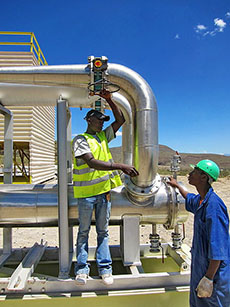 The Library, Documentation and Information Department of the African Studies Centre has compiled this dossier to coincide with the NVAS AFRICA DAY 2015 – AFRICA and TECHNOLOGY on October 17, 2015. It contains a selection of recent titles on Renewable Energy in Africa from the library's online catalogue, including monographs, articles, and chapters from edited works, published since 2013. Each title links directly to the corresponding record in the online catalogue, which provides a more detailed description of every title as well as abstracts of articles and edited works. The dossier starts with an introduction to the topic, followed by sections on Renewable Energy Resources, Planning & Policies, and Local Impact stories illustrating how applied renewable energy technology can change lives as in the case of improved fuel efficient cook stoves and photovoltaics. The dossier concludes with a selection of links to relevant websites.
The Library, Documentation and Information Department of the African Studies Centre has compiled this dossier to coincide with the NVAS AFRICA DAY 2015 – AFRICA and TECHNOLOGY on October 17, 2015. It contains a selection of recent titles on Renewable Energy in Africa from the library's online catalogue, including monographs, articles, and chapters from edited works, published since 2013. Each title links directly to the corresponding record in the online catalogue, which provides a more detailed description of every title as well as abstracts of articles and edited works. The dossier starts with an introduction to the topic, followed by sections on Renewable Energy Resources, Planning & Policies, and Local Impact stories illustrating how applied renewable energy technology can change lives as in the case of improved fuel efficient cook stoves and photovoltaics. The dossier concludes with a selection of links to relevant websites.
The interest among academics, policymakers and the general public in issues of renewable energy in Africa has surged in recent years. Technological advances, political and economic pressures, as well as environmental imperatives, have driven rapid growth in renewable energy production and supply. Important international agreements, such as the Kyoto Protocol and efforts to implement carbon credits, support the search for more renewable energy sources. On the African continent there has been a specific interest in hydroelectricity, as well as wind energy, solar energy, biofuels (such as jatropha oil), and fuel efficient cook stoves. Renewable energy debates have been linked to topics of sustainability and energy policy, but less frequently to existing discussions about natural resource management. In the policy arena, most African governments participate in discussions about renewable energy, and NGOs, such as AFREPREN (African Energy Policy Research Network), play an important role in lobbying and research. Research into renewable energy is conducted at prominent institutions, such as at the Department of Geography, Environmental Management and Energy Studies, the University of Johannesburg.
Despite growing interest in the broader theme of renewable energy, the academic debate continues to suffer from several weaknesses. The first is the gap between policymakers, practitioners and academics. Whereas there are numerous reports and extensive ‘grey literature’ on issues of renewable energy in Africa, there is a limited number of academic peer-reviewed work. Moreover, academics and practitioners are unwilling to share their results with each other. The second weakness is the distance between technical and social science approaches towards renewable energy. The vast majority of academic articles on issues of renewable energy come from the technical or exact sciences, for example, measuring the combustion efficiency or health impacts of improved cook stoves. The social sciences angle is often missing. In the debate on adopting improved cook stoves, this results in accusations of creating ‘cultural barriers’, whereas a social scientist can put such generic categories into context and emphasize specific cooking habits or natural resource management in different localities. Ethnographic and consumer research, questioning why renewable energy sources do or do not work, would be a valuable and a timely addition to the existing debate. Furthermore, a regional or comparative focus could be adopted more systematically. Whereas at present, case studies of renewable energy exist for various localities (West Africa, East Africa, Southern Africa), it is important that these case studies should be linked together, so that comparing their similarities or differences is more straightforward and thus a more effective continent-wide policy framework can be drafted.
Iva Peša
African Studies Centre, Leiden
Selected titles
Renewable Energy Resources
Biogas production in Africa : benefit potentials of cassava biomass / Vincent Okudoh ; Stefan Schmidt ; Cristina Trois. - Saarbrücken : LAP LAMBERT Academic Publishing, 2015
Energizing Africa : achievements and lessons from the Africa Renewable Energy and Access Program (AFREA) Phase I / Energy Sector Management Assistance Program (ESMAP). - Washington : World Bank Group, 2015
Energy alternatives / Sylvia Engdahl, book editor. - Farmington Hills, MI : Greenhaven Press, a part of Gale, Cengage Learning, cop. 2015
Financial aspects of stand-alone solar power systems in Sub-Saharan Africa / Angela Ndhuya Oguna Oruoch. - Kansas City, Missouri : [University of Missouri-Kansas City], 2015
Political economy of climate-relevant policies : the case of renewable energy in South Africa / Mike Morris & Lucy Martin / Institute of Development Studies, Brighton, England. - Brighton : Institute of Development Studies, 2015. - (Evidence report ; No 128)
Power people planet : seizing Africas energy and climate opportunities : Africa progress report 2015 / Africa Progress Panel. - Geneva : 2015
Renewable energy in South Africa's minerals-energy complex : a low carbon transition? / Lucy Baker
In: Review of African Political Economy: (2015), vol.42, no.144, p.245-261 : graf., tab.
The effect of wind turbine transportation on wind farm development in South Africa / Raymond Chengetai Takuba. - [S.l.] : University of Cape Town, 2015
Utility-scale solar photovoltaic power plants : a project developers guide / International Finance Corporation. - Washington : 2015
Economic analysis of grid connected wind generation plants in South Africa / Tamai Hore. - [S.l. s.n.], 2014
Implementation plan for the Stellenbosch Wave Energy Converter on the South-West Coast of South Africa / Jonathan Frick. - [S.l.] : University of Cape Town, 2014
Jatropha as a biofuel crop and the economy of appearances : experiences from Kenya / Carol Hunsberger
In: Review of African Political Economy: (2014), vol.41, no.140, p.216-231 : tab.
Renewable energy projects to electrify rural communities in Cape Verde / Matteo Ranaboldo, Bruno Domenech Lega & David Vilar Ferrenbach
In: Applied Energy, vol.118 (2014), p.280-291: (2014)
Water resources and biofuel production after the fast-track land reform in Zimbabwe / Patience Mutopo & Manase Kudzai Chiweshe
In: African Identities: (2014), vol.12, no.1, p.124-138.
'New agriculture' for sustainable development? : biofuels and agrarian change in post-war Sierra Leone / Roy Maconachie & Elizabeth Fortin
In: The Journal of Modern African Studies: (2013), vol. 51, no. 2, p. 249-277.
Africa in a changing global environment : perspectives of climate change adaption and mitigation strategies in Africa / Shingirirai Savious Mutanga, Thokozani Simelane & Nedson Pophiwa. - Pretoria : Africa Institute of South Africa, 2013
Biofuels or grazing lands? : heterogeneous interests in the Tana Delta, Kenya : a cross-community perspective / Ulrich Pickmeier & Marcel Rutten. - Leiden : African Studies Centre, 2013. - (ASC infosheet ; 16)
Development of wind energy in Africa / Alli D. Mukasa, Emelly Mutambatsere, Yannis Arvanitis & Thouraya Triki / African Development Bank. - Tunis : African Development Bank, 2013. - (Working paper ; no. 170)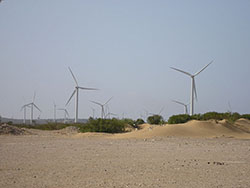
Energias renováveis na África Ocidental : estado, experiências e tendências / Centro Regional de Energías Renovables y Eficiencia Energética;Instituto Tecnológico de Canarias;Casa África, Las Palmas de Gran Canaria. - [Las Palmas] [etc.] : Casa África [etc.], 2013
La conservation de la biodiversité en zone de conflits : le barrage Ruzizi III : alternatives et évalution des impacts environnementaux dans la région des Grands Lacs africains / Katcho Karume. - Paris : L'Harmattan, 2013
La saga d'Inga : l'histoire des barrages du fleuve Congo / François Misser. - Paris : L'Harmattan, 2013. - (Cahiers Africains ; no. 83)
LVEMPII Civil Society watch livelihood case study no. 1 : Assessing changes in community livelihoods within the selected areas in rivers Nyando (Kenya), Simiyu (Tanzania) and Katonga (Uganda) with specific focus on water and sanitation, renewable energy and aquaculture / East African Sustainability Watch Network. - Kampala, Uganda : East African Sustainability Watch, 2013
Powering Africa through feed-in tariffs : advancing renewable energy to meet the continent's electricity needs / Joseph Nganga / World Future Council, Johannesburg;Heinrich-Böll-Stiftung, Cape Town;Friends of the Earth England, Wales & Northern Ireland (FoE-EWNI), London. - Nairobi : Renewable Energy Ventures (K) Ltd, 2013
Un projet de barrage hydroélectrique au Gabon : l'affaire Kongou / Paulin Kialo & Flora Ekozowaka Nguemassa. - Paris : L'Harmattan Editions Distribution, 2013. - (Etudes africaines)
Renewables ... global status report / Worldwatch Institute;Renewable Energy Policy Network for the 21st Century. - Washington, DC : Worldwatch Institute, 2005
Policies & Planning
Accelerating climate-resilient and low-carbon development : the Africa climate business plan / Raffaello Cervigni e.a.. - Washington, DC : World Bank, 2015
Africa 2030 : roadmap for a renewable energy future / International Renewable Energy Agency (IRENA). - Abu Dhabi : International Renewable Energy Agency (IRENA), 2015
Africa power sector : planning and prospects for renewable energy : synthesis report. - Abu Dhabi : International Renewable Energy Agency (IRENA), 2015
Political economy of climate-relevant policies : the case of renewable energy in South Africa / Mike Morris & Lucy Martin / Institute of Development Studies, Brighton, England. - Brighton : Institute of Development Studies, 2015. - (Evidence report ; No 128)
Politiques regionale de la CEDEAO : Energies renouvelables Efficacité énergétique / Abdou Diop. - Senegal : 2015
Power people planet : seizing Africas energy and climate opportunities : Africa progress report 2015 / Africa Progress Panel. - Geneva : 2015
Renewable energy in South Africa's minerals-energy complex : a low carbon transition? / Lucy Baker
In: Review of African Political Economy: (2015), vol.42, no.144, p.245-261 : graf., tab.
SADC renewable energy and energy efficiency status report / Geoff Stiles & Charles Murove / United Nations Industrial Development Organization (UNIDO);Renewable Energy Policy Network for the 21st Century (REN21). - Vienna : United Nations Industrial Development Organization (UNIDO), 2015
Africa Energy energy outlook / International Energy Agency. - Paris : International Energy Agency, 2014
Breakthrough : corporate South Africa in a green economy / Godwell Nhamo. - Pretoria : Africa Institute of South Africa, 2014
Carbon markets and the new 'carbon violence' : a Ugandan study / Kristen Lyons & Peter Westoby
In: International Journal of African Renaissance Studies: (2014), vol.9, no.2, p.77-94.
Economic analysis of grid connected wind generation plants in South Africa / Tamai Hore. - [S.l. s.n.], 2014
Estimating the renewable energy potential in Africa : a GIS-based approach / Sebastian Hermann, Asami Miketa & Nicolas Fichaux. - Abu Dhabi, UAE : IRENA Secretariat, 2014. - (Working paper)
Green economy/growth policies and their implementation in the context of the renewable energy sector : the case of Mozambique, South Africa and Zimbabwe / Theresa Moyo
In: International Journal of African Renaissance Studies: (2014), vol.9, no.2, p.39-60.
Implementation plan for the Stellenbosch Wave Energy Converter on the South-West Coast of South Africa / Jonathan Frick. - [S.l.] : University of Cape Town, 2014
Implementing the South African free basic alternative energy policy : a dynamic actor interaction / Nthabiseng Mohlakoana. - Enschede : University of Twente, 2014
Peak Oil as a stimulus for a green economy transition in South Africa : alternative liquid fuel and transport options / Jeremy J. Wakeford & Mark Swilling
In: International Journal of African Renaissance Studies: (2014), vol.9, no.2, p.133-153 : graf.
REthinking energy 2014 : towards a new power system / Rabia Ferroukhi. - Abu Dhabi : International Renewable Energy Agency (IRENA), 2014
Review of REDD+ and carbon-forestry projects in RFGI countries / Mukundi Mutasa. - Dakar : CODESRIA, 2014. - (Responsive Forest Governance Initiative (RFGI), Working paper ; 2)
South Africa's energy policy : constrained by nature and path dependency / Sören Scholvin
In: Journal of Southern African Studies: (2014), vol.40, no.1, p.185-202 : krt., tab.
Trade and industrial development in Africa: rethinking strategy and policy / Theresa Moyo. - Dakar : CODESRIA, 2014
Africa's renewable future : the path to sustainable growth / International Renewable Energy Agency, Abu Dhabi. - Abu Dhabi : International Renewable Energy Agency (IRENA), 2013
Africa and the European Union : a strategic partnership / Jack Mangala. - New York, NY : Palgrave Macmillan, 2013
Africa in a changing global environment : perspectives of climate change adaption and mitigation strategies in Africa / Shingirirai Savious Mutanga, Thokozani Simelane & Nedson Pophiwa. - Pretoria : Africa Institute of South Africa, 2013
Changement climatique : enjeux socio-économiques et défis technologiques dans les pays du bassin du Congo / Paul Louzolo-Kimbembé. - Paris : L'Harmattan, 2013
Frames in the Ethiopian debate on biofuels / Birgitte Portner
In: Africa Spectrum: (2013), vol. 48, no. 3, p. 33-53.
Fuelling progress or poverty? The EU and biofuels in Tanzania : Policy Coherence for Development in practice / Jasper van Teeffelen / Evert Vermeer Stichting. - Amsterdam : Evert Vermeer Stichting, 2013
Ghana, China, and the politics of energy / Stephanie Rupp
In: African Studies Review: (2013), vol.56, no.1, p.103-130 : krt.
International standardisation in the field of renewable energy / Gideon Richards. - Abu Dhabi : IRENA Secretariat, 2013. - (IRENA report)
Old land, new practices : the changing face of land and conservation in post-colonial Africa / George Barrett
In: Journal of contemporary African studies, ISSN 0258-9001 ; vol. 31, no. 3
Pool énergétique d'Afrique de l'ouest : planification et perspectives pour les énergies renouvelables / Asami Miketa & Bruno Merven / International Renewable Energy Agency (IRENA). - Abu Dhabi : IRENA Secretariat, 2013
Power-sector reform and regulation in Africa : lessons from Kenya, Tanzania, Uganda, Zambia, Namibia and Ghana / Joseph Kapika & Anton Eberhard. - Cape Town : 2013
South Africa's green economy transition : implications for reorienting the economy towards a low-carbon growth trajectory / Martin Kaggwa. - Johannesburg : South African Institute of International Affairs, 2013. - (Occasional paper South African Institute of International Affairs ; no. 168)
Vehicular carbon emissions concentration level in Minna, Nigeria: the environmental cum climate change implication / Okelola Olumayokun Francis & Appollonia Okhimamhe. - Nairobi : African Technology Policy Studies Network, 2013. - (African Technology Policy Studies Network, Working paper series ; 71)
Renewables ... global status report / Worldwatch Institute;Renewable Energy Policy Network for the 21st Century. - Washington, DC : Worldwatch Institute, 2005
Local Impact
A study into the techno-economic feasibility of photovoltaic and wind generated electricity for enhancement of sustainable livelihoods on Likoma Island in Malawi / Collen Zalengera. - Loughborough : University Institutional Repository, 2015
Building local capacities to monitor methane extraction in Lake Kivu / Natacha Pasche... [et al.]
In: Sustainable access to energy in the Global South : essential technologies and implementation approaches / ed. by Silvia Hostettler e.a. - New York : Springer: (2015), p. 235-244
Deconstructing discriminatory technologies: insights into inclusive development from improved cookstove projects in Nigeria / Temilade Sesan
In: Sustainable access to energy in the Global South : essential technologies and implementation approaches / ed. by Silvia Hostettler e.a. - New York : Springer: (2015), p. 217-228
Energy storage integrated solar stove : a case of solar Injera baking in Ethiopia / Asfafaw Haileselassie Tesfay, Ole Jorgen Nydal & Mulu Bayray Kahsay. - IEEE Global Humanitarian Technology Conference (GHTC 2014) : 2015
Holistic approach to sufficient, reliable, and efficient electricity supply in hospitals of developing countries: Cameroon case study / Guy Merlin Ngounou... [et al.]
In: Sustainable access to energy in the Global South : essential technologies and implementation approaches / ed. by Silvia Hostettler e.a. - New York : Springer: (2015), p. 59-77
Putting the end-user first: towards addressing contesting values in renewable energy systems deployment for low-income households : a case from Likoma Island, Malawi / Collen Zalengera... [et al.].
In: Sustainable access to energy in the Global South : essential technologies and implementation approaches / ed. by Silvia Hostettler e.a. - New York : Springer: (2015), p. 101-111
Techno-economic feasibility of green charcoal production in Kenya / Kevin S. Kung... [et al.]
In: Sustainable access to energy in the Global South : essential technologies and implementation approaches / ed. by Silvia Hostettler e.a. - New York : Springer: (2015), p. 87-100
Special issue : gender and climate change / Urmilla Bob & Agnes Babugura. - Durban : Agenda Feminist Media, 2014. - (Agenda, ISSN 2158-978X ; vol. 28, no. 3)
Technologizing humanitarian space: Darfur Advocacy and the rape-stove panacea / Samer Abdelnour; Akbar M. Saeed.
In: International Political Sociology: (2014), no. 8, p. 145-163
Exploitation and conservation of Middle East tree resources in the oil era / Hiroshi Nawata, Shun Ishiyama & Ryo Nakamura / Research Institute for Humanity and Nature, Kyoto. - Kyoto : Shoukadoh Book Sellers, 2013. - (Arab subsistence monograph series ; vol. 1)
Ecocultural control of natural energy resources in Southern Ethiopia / Hermann Amborn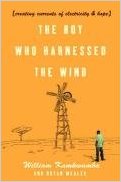
In: Aethiopica / Asien-Afrika-Institut: (2012), vol. 15, p. 118-135 : krt.
Burning in the sun / Cambria Matlow & Morgan Robinson. - [S.l.] : Birdgirl Productions, 2010. - 1 dvd-video (83 min.). : kleur.
The boy who harnessed the wind : creating currents of electricity and hope / William Kamkwamba & Bryan Mealer. - London : HarperCollins, 2009
Films on YouTube
Cooking stoves as Frugal Innovations / Iva Pesa. - CFIA workshop on Frugal Innovation, 2015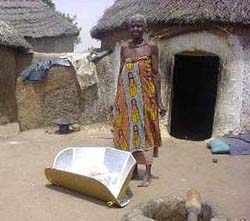
Energy / World Bank, 2015
46 videos on (renewable) energy in developing countries with a focus on Africa
What if we change - improving energy efficiency in Africa / Jeff Barbee, 2013
Correspondent Jeff Barbee reports from South Africa, Botswana, Namibia, and Malawi on how energy from the sun, wind, water, and even garbage not only helps the environment but prove that it is just good business to go with renewables.
Selected (web) resources
Africa’s Energy Landscape (Milken Institute, non-profit think tank)
This panel focuses on trends, opportunities and models for unlocking Africa's energy potential. The supply of power is among the most significant factors holding back economic growth in sub-Saharan Africa. With smart investments in energy projects and technologies, Africa has the potential to tap vast resources that will attract international business and investment, create jobs and improve livelihoods. Business leaders and entrepreneurs are transforming the power sector, but how can their success be scaled up to bring reliable electricity to the 600 million Africans living without it? As more stakeholders see the possibilities of African energy, and with the support of initiatives such as the U.S. government's Power Africa, the continent is positioned to become a tabula rasa for innovations in energy technology, distribution and financing. This panel will focus on trends, opportunities and models for unlocking Africa's energy potential.
https://www.youtube.com/watch?v=UVx9W4h1d0g
Energy Sector Management Assistance Program (ESMAP)
The Energy Sector Management Assistance Program (ESMAP) is a global knowledge and technical assistance program administered by the World Bank. It provides analytical and advisory services to low- and middle-income countries to increase their know-how and institutional capacity to achieve environmentally sustainable energy solutions for poverty reduction and economic growth. African countries in which ESMAP is active: Ethiopia, Lesotho, Madagascar, Malawi , Tanzania, Zambia
https://www.esmap.org/
Energy, Environment and Development Network for Africa (AFREPREN)
The Energy, Environment and Development Network for Africa is an organisation based in Nairobi, Kenya, with a wide-ranging expertise on energy in eastern and southern Africa. Their objective is to strengthen the local capacity for research into energy issues, so as to bridge the gap in Africa between energy research and renewable system implementation. The particular areas of focus for the organisation are energy sector reform, energy services for the urban poor, rural development, issues relating to gender and energy, and strategic issues and studies. The organisation also offers a large list of publications that it has produced, as well as collaborative efforts, available via request. In addition, a list of upcoming energy events throughout Africa can be found. Finally, the organisation offers a summary of the latest developments in renewable energy in Africa, providing a brief overview as well as a link to the full text.
http://www.afrepren.org/
African Biofuel and Renewable Energy Company ABREC (for profit)
The African Biofuel and Renewable Energy Company ABREC works to promote renewable energy and energy efficient technologies in Africa. Although Africa has rich resources of clean energy in the form of solar, wind, biomass and hydro power turning this technical potential into a practical capacity requires a number of conditions. Among others it depends on bringing together human skills, expertise, financial resources as well as helping to bring about change in the institutional and policy setting levels to enable change and transformation towards a clean energy system. The African Biofuel and Renewable Energy Company works to drive uptake of clean energy and energy efficient technologies to improve the livelihoods of African people, to help mitigate climate change and help ensure energy security in Africa.
https://www.saber-abrec.org/
Se4all African Hub
Some 590 million people in Sub-Saharan Africa lack access to electricity and some 690 million still rely predominantly on solid fuels for cooking. 19 of the 20 countries with the lowest energy access rates globally are in Sub-Saharan Africa. 30 African countries face regular energy shortages, costing firms around 5% of their sales. Energy costs are extremely high and sources often highly polluting. Africa’s annual consumption is just enough to run a single light bulb per inhabitant on the continent for three hours a day. Access to sustainable energy is therefore a priority for Africa and a necessary precondition to achieving many development goals that extend far beyond the energy sector – eradicating poverty, increasing food production, providing clean water, improving public health, enhancing education, creating economic opportunity, and empowering women.
http://www.se4all.org/hubs/african-hub/
Renewable Energy Policy Network for the 21st Century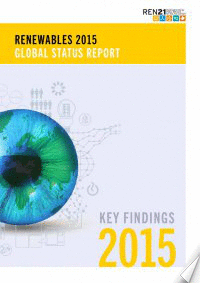
REN21 is the global renewable energy policy multi-stakeholder network that connects a wide range of key actors. REN21’s goal is to facilitate knowledge exchange, policy development and joint action towards a rapid global transition to renewable energy. REN21 brings together governments, nongovernmental organisations, research and academic institutions, international organisations and industry to learn from one another and build on successes that advance renewable energy. To assist policy decision making, REN21 provides high quality information, catalyses discussion and debate and supports the development of thematic networks.
Their flagship publication Renewables Global Status Report (GSR) provides an annual look at the tremendous advances in renewable energy markets, policy frameworks and industries globally. Each report uses formal and informal data to provide the most up-to-date information available. Reliable, timely and regularly updated data on renewable energy are essential as they are used for establishing baselines for decision makers; for demonstrating the increasing role that renewables play in the energy sector; and illustrating that the renewable energy transition is a reality.
https://www.ren21.net/
The South African International Renewable Energy Conference (SAIREC)
In October 2015, South Africa has become the sixth country, and the first in Africa, to host the International Renewable Energy Conference (IREC). Convened by the Renewable Energy Policy Network for the 21st Century (REN21), IREC is a high-level political conference series hosted by a national government. Hosted by the South African Department of Energy together with the South African National Energy Development Institute (SANEDI), under the theme RE-energising Africa, SAIREC demonstrates why Africa is the business destination for the renewables energy sector given its current growth trajectory and need for investment in clean energy to underpin sustainable economic growth.
https://www.ren21.net/wp-content/uploads/2019/05/SAIREC_Report_Final.pdf
Portal International Renewable Energy Agency (IRENA)
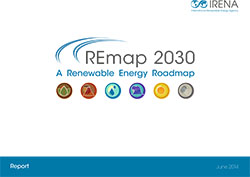 Among other things IRENA regularly updates a portal giving access to a global collection of existing materials on renewable energy potentials (wind, solar, biogas, hydro, marine and geothermal). This led to more than 10, 000 references being collated from those available over the internet. The references broadly cover different types of information, from GIS-based systems, to grey literature providing some information on a country. The geographic scale of the different references also varies widely, from global analyses to continent, country or regions.
Among other things IRENA regularly updates a portal giving access to a global collection of existing materials on renewable energy potentials (wind, solar, biogas, hydro, marine and geothermal). This led to more than 10, 000 references being collated from those available over the internet. The references broadly cover different types of information, from GIS-based systems, to grey literature providing some information on a country. The geographic scale of the different references also varies widely, from global analyses to continent, country or regions.
The definition of renewable energy potentials was considered in its broader sense. In reality, most of the studies provide an indication of a renewable energy resource - the incoming energy, and a very few studies indicate the potential – the energy usable for human applications. The choice of definition was deliberate allowing for the collection of available information even from those topics that are rarely studied, and where any indication of a potential resource has value in initiating further investigations.
The system developed by IRENA only provides links to the information. It is not intended to duplicate the vast amount of available knowledge on IRENA’s servers. This approach enables the project to maintain a relatively light infrastructure, to add missing information dynamically, and to avoid issues with intellectual property rights. Conversely, this means the database is sensitive to changes in internet links.
African focus areas: Mozambique Renewable Energy Atlas, South Africa Wind Atlas
https://www.irena.org/
AREA - African Renewable Energy Alliance Network
The African Renewable Energy Alliance Network is an online platform, bringing together representatives from governments, businesses and civil society in order to exchange information and expertise for the uptake of renewable energy technologies in Africa. Particular areas of interest include financial and policy mechanisms for the increased dissemination of RETs. The AREA Network website acts as a social networking platform, enabling members to co-operate and share experience and capacity in a online setting. The website offers a discussion forum for members, as well as listings for relevant teaching and networking events throughout Africa and the World. In addition to this, a comprehensive selection of videos, uploaded by members, is provided, as well as job listings, and a regular news service/blog. Topics covered by members of the website include the relevance of hydro-electric power to African needs, biofuels (particularly those derived from Jatropha oil), and off-grid solutions for rural electrification.
http://area-network.ning.com/
Africa Carbon Forum
The Africa Carbon Forum is a trade fair and knowledge sharing platform for carbon investments in Africa. It is a place to discuss the latest development in the carbon market and how the Clean Development Mechanism (CDM) and other mitigation mechanisms can be successful in Africa. The Africa Carbon Forum includes matchmaking and deal facilitation sessions where carbon project developers can showcase their projects to investors and carbon buyers.
In November 2006, the United Nations Secretary-General launched the Nairobi Framework to improve the support of the Kyoto Protocol’s Clean Development Mechanism (CDM) in underrepresented regions, including Africa. Since then, Africa’s interest and involvement in the Clean Development Mechanism has grown, and with it the number of projects in Africa. Nevertheless, Africa still accounts for less than three per cent of the more than 7,500 CDM projects registered to date in 105 countries. The first Africa Carbon Forum was organized in Senegal in 2008, followed by Nairobi (2010), Marrakech (2011), Addis Ababa (2012), Abidjan (2013), Windhoek (2014) and Marrakech (2015).
https://africacarbonforum.com/
Renewable Energy and Energy Efficiency Partnership (REEP)
Renewable Energy and Energy Efficiency Partnership (REEP) is an international non-profit organization that advances markets for clean energy in developing countries. Founded during the Johannesburg UN Conference on Sustainable development in 2002, REEEP has built up experience in managing funds and delivering outcomes for nearly two hundred clean energy projects in the developing world.
https://reeep.org/?s=Africa

